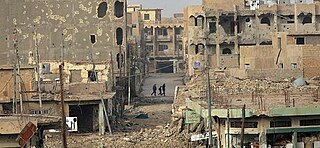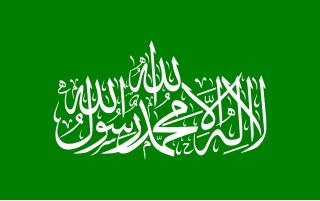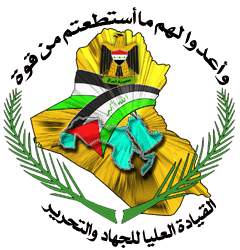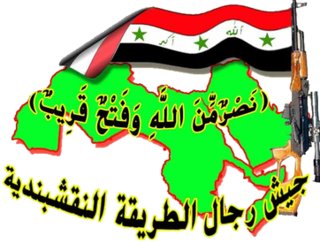
Jamaat Ansar al-Sunnah, also known as Jaish Ansar al-Sunna, Ali ibn Abi Talib Battalion or simply as Ansar al-Sunnah was an Iraqi Sunni insurgent group that fought against US troops and their local allies during the Iraq War. The group was primarily based in northern and central Iraq, and included mostly Iraqi fighters. In 2007, it split; with its Kurdish members pledging allegiance to Ansar al-Islam, and its Arab members creating a group called Ansar al-Sunnah Shariah Committee, before changing its name to Ansar al-Ahlu Sunnah in 2011.

An Iraqi insurgency began shortly after the 2003 American invasion deposed longtime leader Saddam Hussein. It is considered to have lasted until the end of the Iraq War and U.S. withdrawal in 2011. It was followed by a renewed insurgency.

The Islamic Army in Iraq (IAI) was one of a number of underground Islamist militant organizations formed in Iraq following the 2003 invasion of Iraq by U.S.-led Coalition forces, and the subsequent collapse of the Ba'athist regime headed by Saddam Hussein. IAI was regarded as one of the largest, sophisticated and most influential Sunni insurgent groups in Iraq that led an asymmetrical military insurgency against Coalition forces. The group became known for its grisly videos of kidnappings and attacks on U.S. and Iraqi troops.

The Iraqi civil war was a civil war fought mainly between the Iraqi government along with American-led coalition forces and various sectarian armed groups, mainly Islamic State of Iraq and the Mahdi Army, from 2006 to 2008. In February 2006, the anti-American insurgency escalated into a sectarian civil war after the bombing of Al-Askari shrine, considered as a holy site in Twelver Shi'ism. US President George W. Bush and Iraqi officials accused Al-Qaeda in Iraq of orchestrating the bombing, although AQI publicly rejected any links to the attacks. The incident set off a wave of reprisals by Shia militants on Sunni civilians, followed by Sunni counterattacks on Shia civilians.

The 1920 Revolution Brigades was a Sunni militant group in Iraq, which included former members of the disbanded Iraqi army. It was established by the members of the former Ba'ath army of Saddam Hussein in 2003 following the American invasion. The group had used improvised explosive devices, and armed attacks against U.S.-led Coalition forces. The group comprises the military wing of the Islamic Resistance Movement. The group was named in reference to the Iraqi revolt of 1920.

The Mujahideen Shura Council (MSC) (Arabic: مجلس شورى المجاهدين في العراق), was an umbrella organization of at least six Sunni Islamic insurgent groups taking part in the Iraqi insurgency against U.S. and coalition and Iraqi forces: Tanzim Qaidat al-Jihad fi Bilad al-Rafidayn ('al-Qaeda in Iraq'), Jaish al-Ta'ifa al-Mansurah, Katbiyan Ansar Al-Tawhid wal Sunnah, Saraya al-Jihad Group, al-Ghuraba Brigades, and al-Ahwal Brigades.
Jeish Muhammad is an Iraqi militant group that is both politically and religiously motivated. The politically motivated faction within JM is primarily made up of former Ba'athist members mainly from the Sunni region. Many who enjoyed special status during the leadership of Saddam Hussein were from Tikrit, which is in turn within an area of Iraq where the Arab population is mostly Sunni. People who generally hold the ex-vice-president, Izzat Ibrahim ad-Douri, in exceptionally high esteem were members of the security, intelligence and police forces from the previous government.
Sectarian violence in Iraq developed as a result of rising sectarian tensions between the different religious and ethnic groups of Iraq, most notably the conflict between the Shi'i Muslim majority and the Sunni Muslim minority within the country.
The Jaish al-Rashideen group was a Sunni Iraqi insurgent group taking part in many guerrilla attacks against U.S.-led Coalition forces using IEDs, sniper fire, and firing rockets and mortar bombs. The group had been operating in Iraq since the middle of 2003. Jaish al-Rashideen conducted its attacks in the volatile Sunni Triangle, Baghdad Belts, Salah al-Din and in western Diyala. Its members are believed to be mostly native Iraqi Sunni Muslims, including persons previously serving in Saddam Hussein's national forces such as the Republican Guard, Special Republican Guard, Fedayeen Saddam and the Mukhabarat.

Jihadism is a neologism for militant Islamic movements that are perceived as existentially threatening to the West. It has been applied to various insurgent Islamic extremist, militant Islamist, and terrorist individuals and organizations whose ideologies are based on the Islamic notion of jihad. It has also been applied to various Islamic empires in history, such as the Umayyad Caliphate and the Ottoman Empire, who extensively campaigned against non-Muslim nations in the name of jihad.
The Jihad and Reform Front (JRF), or Reformation and Jihad Front (RJF), is a Sunni insurgent coalition in Iraq that announced its formation on May 2, 2007. The announcement was posted on several jihadist websites.

Al-Qaeda in Iraq or al-Qaeda in Mesopotamia, officially known as Tanzim Qaidat al-Jihad fi Bilad al-Rafidayn or TQJBR, was a Sunni jihadist organization affiliated with al-Qaeda, during the period from 17th of October 2004 to 15th of October 2006.

Hamas of Iraq was a Sunni militia group based in Iraq, which split from the 1920 Revolution Brigades on 18 March 2007. The group claims to have released videos of its attack on US troops. The 1920 Revolution Brigades insists that Hamas in Iraq was involved in assisting US troops in their recent Diyala operations against Al-Qaeda in Iraq. Iraqi Prime Minister Nouri al-Maliki has feared the US-armed 'concerned local citizens' are an armed Sunni opposition in the making, and has argued that such groups should be under the command of the Iraqi Army or police. On October 11, 2007, the militia group joined a political council that embraced armed insurgency against American forces.

The Supreme Command for Jihad and Liberation is an Iraqi front comprising some 23 militia groups formed in October 2007 and were led by former Iraqi vice president and deputy chairman of the Revolutionary Command Council Izzat Ibrahim al-Douri. The name is also often used to refer to the largest militia in the front, the Army of the Men of the Naqshbandi Order, which was commanded by Douri himself.

The Jaish al-Mujahideen was a Sunni militant group in Iraq. The group first emerged in late 2004. The Mujahideen Army is one of the founding members of the Jihad and Reform Front as well as a member of the Political Council for the Iraqi Resistance (PCIR). The Mujahideen Army is comprised almost exclusively of native Iraqi Sunni Muslims, including ex-members of Saddam Hussein's military and security agencies such as Fedayeen Saddam, Special Republican Guard, Republican Guard and the Special Security Organization.
Mujahideen, or Mujahidin, is the plural form of mujahid, an Arabic term that broadly refers to people who engage in jihad, interpreted in a jurisprudence of Islam as the fight on behalf of God, religion or the community (ummah).
The Al Anbar Governorate election of 2009 was held on 31 January 2009 alongside elections for all other governorates outside Iraqi Kurdistan and Kirkuk.

The Army of the Men of the Naqshbandi Order, also called the Naqshbandi Army, is one of a number of underground Ba'athist and Sufi militant insurgency groups fighting U.S.-led Coalition forces in Iraq. Media frequently refers to the group by the initials JRTN, a romanization of its Arabic name. Supreme Command for Jihad and Liberation, technically the name of the umbrella organisation to which JRTN belongs, is also often used to refer to JRTN specifically.
The term Axis of Resistance is a label used by pro-Iranian commentators to refer to an informal anti-Israeli and anti-Western political and military coalition led by the Iranian government. It includes the Syrian Arab Republic, Lebanese Shia militant group Hezbollah and various militant groups in Palestine.

The Islamic State of Iraq, was a Salafi jihadist militant organization that fought the forces of the U.S.-led coalition during the Iraqi insurgency. The organization aimed to overthrow the Iraqi federal government and establish an Islamic state in Iraq.












